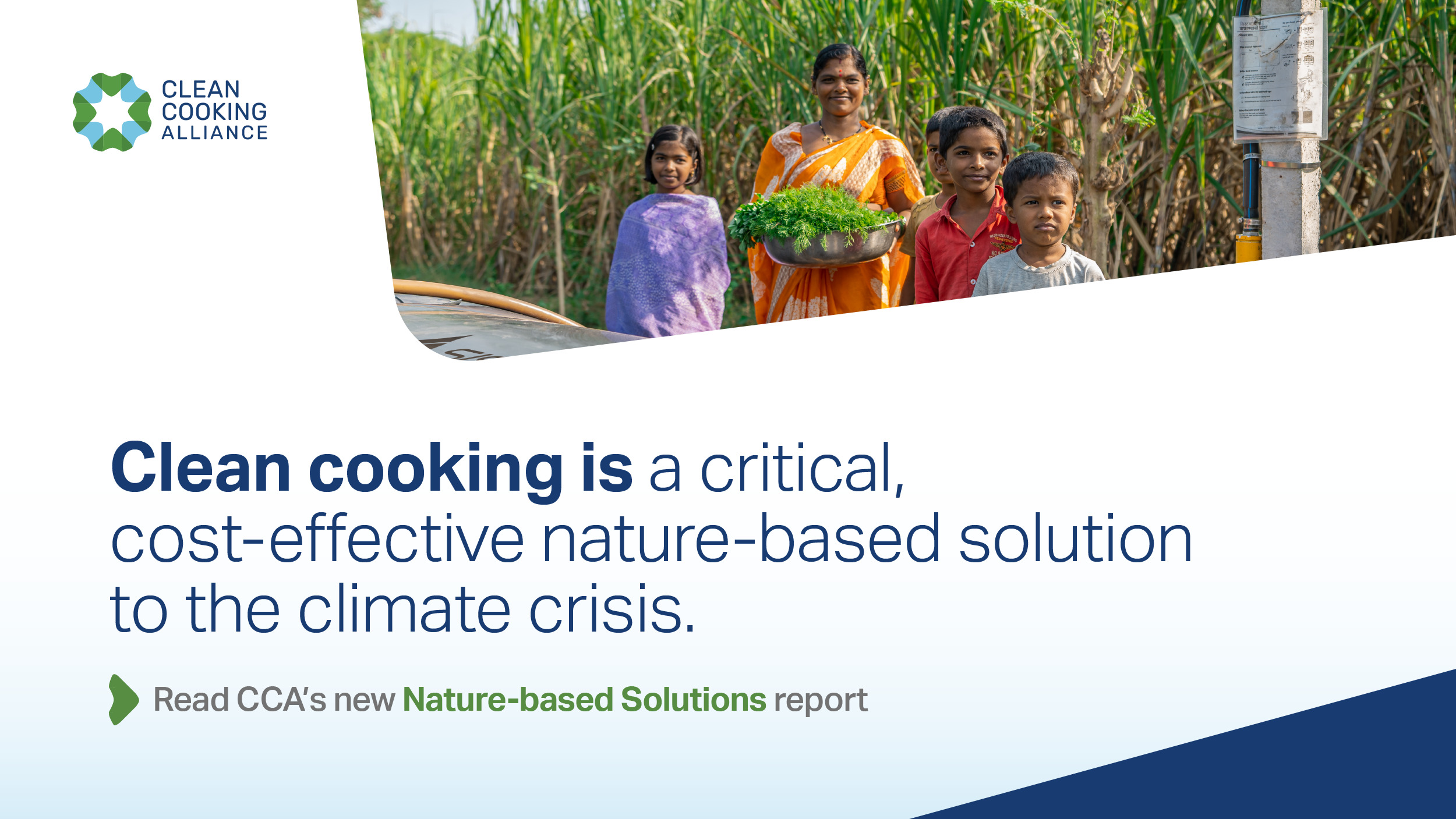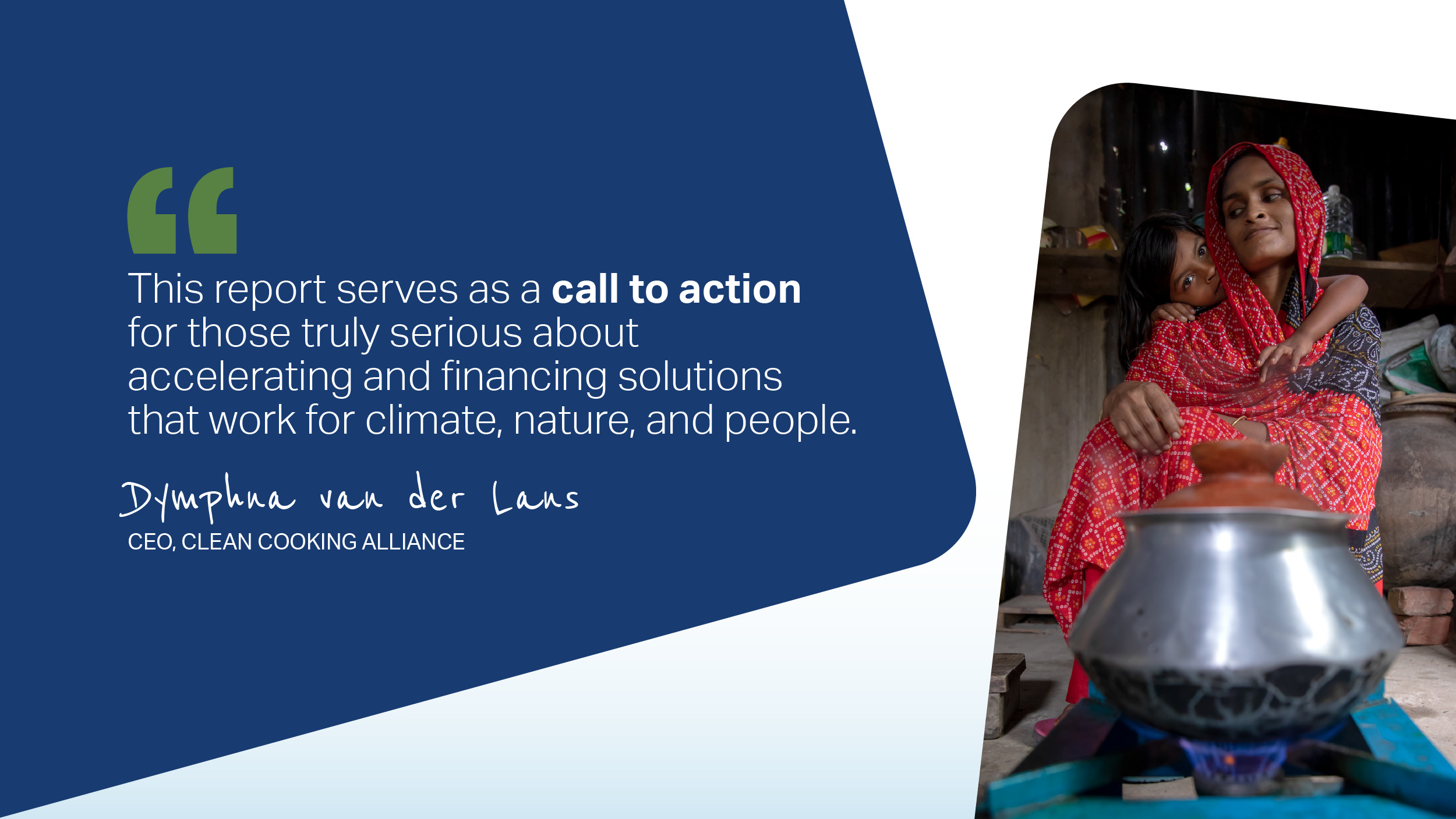NEW REPORT: Clean Cooking Is a Necessary, Nature-based Solution to Climate Change
WASHINGTON, D.C., August 30, 2022 — New research from the Clean Cooking Alliance released today underscores the need for the global community to expand access to cleaner cooking fuels and technologies, illustrating their potential to mitigate climate change as a nature-based solution. As communities around the world face a summer of extreme heat, drought and fire, the report sheds light on cooking as an often-overlooked cause of global carbon emissions, forest degradation, and preventable illness among women and children in developing countries.
Accelerating Clean Cooking as a Nature-based Climate Solution examines how investing in clean cooking practices is key to achieving global climate and development goals – and to advancing nature-based solutions. Today 2.4 billion people around the world, especially in Asia and sub-Saharan Africa, do not have access to clean cooking. The World Bank estimates that this costs the world more than $2.4 trillion each year, driven by adverse impacts on health, nature, climate, and gender equality, and contributes to 3.2 million premature deaths annually.
“As governments, investors, and corporate actors determine how to meet their commitments to achieving net-zero carbon emissions, clean cooking cannot be ignored as a fundamental part of the equation,” said Dymphna van der Lans, Chief Executive Officer of the Clean Cooking Alliance. “Lack of access to clean cooking is a major threat to nature, climate, and sustainable livelihoods. Every year, cooking with solid fuels produces as much climate-harming emissions as the airline industry, including more than half of human-generated emissions of black carbon, which is 1,500 times more impactful on global warming than CO2. Until we advance global access to clean cooking, all of our climate mitigation measures, including nature-based solutions, are at risk.”
The UN Climate Action Summit in 2019 identified nature-based solutions (NBS) as a fundamental component of addressing climate change and protecting biodiversity. NBS are defined as actions to protect, sustainably manage, and restore natural or modified ecosystems in order to address challenges like climate change. Research has indicated that NBS can provide over one-third of the cost-effective climate mitigation needed between now and 2030 to limit warming to below two degrees Celsius.
“There is an intrinsic connection between advancing clean cooking and mitigating climate change,” said Jillene Connors Belopolsky, Chief of Staff and Chief External Affairs Officer at the Clean Cooking Alliance. “Clean cooking is one of the most important, cost-effective tools we have to reduce carbon emissions, improve public health and conserve the environment. Scaling up clean cooking solutions can help reduce direct emissions, avoid emissions from forest degradation, enable carbon removal, protect biodiversity, improve air quality, support sustainable economic growth, and improve food security. It’s time we invest in clean cooking as a nature-based climate solution.”
The report outlines specific recommendations for how governments, investors, companies, and NGOs can dramatically accelerate action for clean cooking and scale finance to create incentives for companies serving remote and vulnerable communities, including:
- How governments should integrate clean cooking into nationally determined contributions (NDCs) as well as programs on environment and climate and leverage international and national private finance for clean cooking through cooperation and transactions of the Paris Agreement’s Article 6, as well as other gender, health, and biodiversity impact-linked instruments.
- The need to develop tools, led by local conservation organizations, to meet the needs of communities with unsustainable fuelwood harvesting practices but a high dependence on nature to support their livelihoods.
- How clean cooking companies can pursue new partnerships with conservation organizations, local government stakeholders, and other environmental groups to leverage clean cooking value chains for nature-based solutions.
- Guidelines for corporations to ensure that they are aligning with the global standards on nature-based solutions and that clean cooking is a central component in their nature-related carbon removal and sustainable agriculture investments as well as in supply chain, environmental, social, and governance standards and targets.
- The need for investors to drastically scale finance for the clean cooking sector and to identify where clean cooking solutions can help to de-risk their investments in nature-based solutions.
To read the full report, click here.


